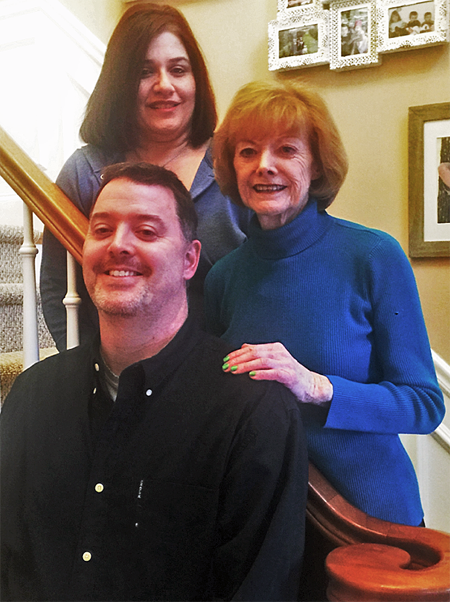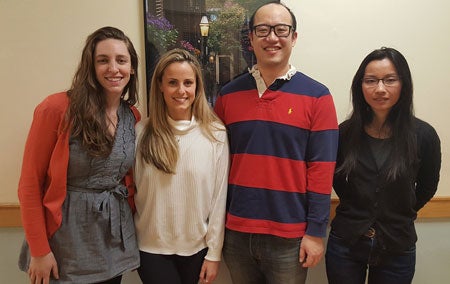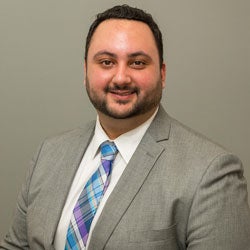- A Son's Love and a New Kidney for Norah
- Orthopedics Resident Tackles Opioid Overprescribing
- What do you do, Sean Nabi?
- ACO in Action: The First Month
- Awards and Accolades
- News of Note
A Son's Love and a New Kidney for Norah

When Norah Burns took medication for her allergies in May 2015, she thought she’d just feel better the following day. But when the next morning she woke up with a bright yellow eye and a swollen leg, she knew something much more serious than seasonal allergies was going on.
Norah went to her local hospital and was transferred the next day to Boston Medical Center. There, physicians worked to remove the additional 40 pounds of fluid that had built up in her body and kept an eye on her pulmonary hypertension. When the process to remove wasn’t working, they had to try a different method, which had a risk of kidney failure. The fluid was successfully removed from her body, but Norah did lose kidney function and she would need dialysis.
After six and a half weeks, Norah was released from the hospital. Her life on dialysis began – three times a week for two and a half years – while awaiting the opportunity for a kidney transplant. Several family members were tested to see if they were matches, but none were. Since the beginning of Norah’s health saga, her son John had been thinking about donating his kidney. Originally adamant that her son would not be a donor due to his having a young family, Norah finally agreed to have John tested. He was a match.
“I’m lucky because I have a very supportive family, especially my wife Laura,” says John. “Because other family members were volunteering and being tested, we had time to consider what we would do if I were a match. We needed to balance the needs of our kids with my mother’s needs. BMC doctors were very helpful in explaining what factors they could control and what they couldn’t. Ultimately, we felt we could control enough aspects where I wouldn’t be endangering my long-term health or our family’s financial future.”
“Unfortunately, we have first-hand knowledge of what renal failure does to a person, and we didn’t want that life for Mom,” says Laura. “Dialysis can take over your life – you can’t travel, you have to go for treatment so often – with “off days” spent recuperating. Mom is a young, active person. We knew that dialysis wasn’t the best long-term solution for her. We wanted to help however we could.”
John was originally supposed to donate his kidney to Norah in the beginning of October 2017. But in the final round of testing, doctors found a positive crossmatch between Norah and John, which means that her cells would attack John’s kidney cells if the transplant went through, leading to a high probability of rejection. Because of this, the transplant was delayed and Norah underwent plasmapheresis and globulin infusion, procedures that clean her blood of the antibodies that would have attacked the donated kidney.
A few days before the rescheduled transplant, Laura was diagnosed with a contagious virus. Because Norah lives with John and Laura, she had already been exposed. Moving forward with the transplant was too dangerous for Norah. If she had picked up the virus when her immune system was compromised after the transplant, it could have been fatal.
The transplant was delayed again until Laura no longer showed signs of illness. But before the rescheduled surgery was to take place, testing picked up another positive crossmatch between Norah and John. Norah underwent plasmapheresis a second time. Meanwhile, the BMC transplant team was looking into a potential kidney swap with other Boston transplant centers. John and Norah became part of a seven-couple swap and were matched to a donor and recipient who were better matches for both of them. Surgery for the swap was scheduled for January 3, 2018.
“Our surgery was delayed many times, so we were on an emotional rollercoaster,” says John. “Each time, we found out right before the surgery, which made things hard.”
This time, there wasn’t a delay, but a speeding up of the process. On December 20, BMC’s transplant team called Norah to tell her that they had a kidney from a deceased donor. This donor was not just an exact match, but a rare kind of perfect match that’s like getting a kidney from your identical twin. Later that day, Norah was in transplant surgery, finally getting her new kidney.
“Our lives revolved around this whole process for six months, but every time we came to a goal, it would fail to come to fruition,” says John. “But when we got the call that BMC had a kidney, there was no time to even think. You get used to moving in a careful, plodding manner, but then there was just an immediate surge.”
While the donor kidney meant that John and Norah were no longer a part of the kidney swap, they learned that the swap wasn’t going to happen anyway. One of the recipients had become very sick and the swap couldn’t take place as planned.
“It was one step forward and five steps back,” says Laura. “But our story shows that if you have hope and encouragement, things work out. Our hearts go out to the family who lost a loved one. We are so appreciative of the gift they’ve given Mom.”
Now nearly three months past her transplant, Norah is recovering very well.
“I’m feeling terrific and looking forward to getting out Irish dancing soon,” says Norah. “My experience at BMC was the best treatment I could have asked for. Everyone was right there if I needed anything or had any questions. And I’m the most blessed mother on the face of the earth. John and Laura were both there every step of the way. My advice to people waiting for a transplant is to not be discouraged – you too may receive a phone call like mine.”
April is Donate Life Month. BMC will be holding a flag raising to honor the month on Wednesday, April 4 at 3 p.m. on the Moakley Green. To learn more about organ donation, visit http://donatelifenewengland.org/.
Orthopedics Resident Tackles Opioid Overprecribing

At Boston Medical Center, we have many programs to help people with substance use disorders get appropriate treatment. But how do we help keep people from misusing opioids in the first place? The reasons people start misusing opioids are complex and varied, but evidence shows that overprescribing of prescription opioids play a role. Typically, there have not been strong guidelines on how to best prescribe patients enough opioids to treat pain without overprescribing. Eric Chen, MD, PhD, a third year resident in Orthopedic Surgery, aimed to change that with a research project on opioid prescribing guidelines.
“At BMC, we have a frontline view to the opioid epidemic and how it affects patients,” says Chen. “As an intern, I was often responsible for prescribing opioids to patients and as I entered my research year, I wanted to see if there was a way to improve on our prescribing practices.”
During the early years of his residency, Chen realized that there was no standard way he and his colleagues were prescribing opioids to patients after orthopedic surgery. Instead, they relied on their clinical judgment, which included a mix of what they were taught by prior residents and what it seemed patients might need. His research shows that this was standard across surgical departments at BMC and other hospitals, leading to a lot of variation in how pain medication was prescribed.
“We found that patients would get an average of 60 tablets of pain medication after surgery, even if the surgery was minimally invasive,” says Chen. “Patients were told to take one to two tablets every four to six hours as needed, but we didn’t tell them when to stop taking the medication.”
With his research in mind, Chen felt that he could develop a tool to help reduce variation in opioid prescribing after surgery and help ease provider concerns about overprescribing. He took his idea to Paul Tornetta III, MD, chair of the Department of Orthopedic Surgery and director of the department’s residency program, who put him in touch with the QI Hub.
The QI Hub, which was created by BMC’s Quality Leadership in partnership with the BU Continuing Medical Education office, works to create and support a culture of health care quality improvement. They work across the organization to provide education, mentorship, and other support for QI projects.
The QI Hub helped Chen form a team, which included Emma Trucks as a project manager and Lauren Betancourt, a public health student, and LuLu Li, a medical student, to help with research. Together, they set up a project plan, reached out to senior leadership for support, and set up continuing medical education credits for faculty who took part in the QI effort.
With this support and research, Chen developed an algorithm to determine how to prescribe opioids to patients being discharged after inpatient orthopedic surgery. The tool takes into account individual opioid requirements prior to discharge to create patient-specific plans to taper the medication after discharge. Patients receive an appropriate amount of pain medication and instructions on how to take it properly in order to wean themselves off.
“Every patient experiences pain differently, so this tool aims to give patients the pain medication they need while tapering down slowly over one to two weeks,” says Chen.
Chen and his team then trialed the tool with orthopedic nurse practitioners, including Kaye Bemis, Margaret Kerns, Debi McNeil, and Steve Forlivio, and residents, who do most discharges in Orthopedics and would primarily be the ones using the tool. They also worked with nurse educators, Molly Laferte, NP, and Kate Baudin, NP, on making sure nurses could effectively explain the taper to patients. With buy-in and tweaks from these groups, Chen launched the tool in Orthopedics in May 2017.
In the following nine months, opioid prescribing has decreased by 27 percent for patients who had inpatient orthopedics surgery. In addition, patient feedback obtained by Li and Betancourt shows that the majority of patients said they still felt they got an adequate amount of pain medication.
As the team analyzes more data, Chen hopes to improve the tool to make it even more accurate. In addition, he plans to share the results across the hospital and try to expand the tool to other subspecialties.
“I’m really lucky that I had so much support and buy-in from the Orthopedics department, from the chairman to nurses and interns,” says Chen. “People had to change their daily practice, which isn’t easy, and I appreciate their support. Working with the QI Hub to get their guidance and expertise was also a tremendous help.”
“This is one of the first direct partnerships between BMC’s QI Hub and a clinical department in which we allocated resources and support to ensure a successful quality improvement initiative,” says James Moses, MD, chief quality officer. “This initiative has significant value for us institutionally, given ensuring best practice adherence to opioid prescribing across our surgical services was prioritized as the first Grayken Center for Addiction goal. The orthopedics approach is an internal best practice and we are actively working to ensure we spread it across other services as we continue our focus on this important clinical issue.”
What do you do, Sean Nabi?

Name: Sean Nabi, JD
Title: Privacy officer
Time at BMC: One month
Q: What do you do at BMC?
A: Privacy officer is a multifaceted role. Part of the job is focusing on laws like HIPAA and CAN-SPAM, a marketing law, which govern how we deal with patient information. My role is to help the organization understand how we can meet our obligations to our patients while complying with these complex laws.
I also do a significant amount of work advocating on behalf of our patients to ensure that we do right by them. This office does a lot of work following up with patients who report incidents or who we hear had difficult situations to try to understand what happened and talk to them about what their rights are.
We also do some work in patient safety. For example, we might work with providers who see an issue to help them understand what their options are and how they can potentially report the situation.
Privacy law is extremely complex because it touches on so much, from patient care to fundraising. People think privacy laws only tell you what you can’t do with patient information, but they actually set the ground rules for how you can use information. Privacy officers are not cops out to punish people. We take a proactive approach in helping people understand how to share information for legitimate medical reasons.
Q: What brought you to BMC?
A: I have a long history with BMC. My father was an associate professor at Boston University School of Medicine and my sister is a graduate of BUSM where she met her husband. They were here when this place was City Hospital and made the transition to Boston Medical Center.
During that time, I came with my dad and came to visit my sister, and I even volunteered at City Hospital, transporting patients. Even at a young age, I always understood what this institution means to the community it serves. It’s unmatched.
One of the underlying reasons why I really wanted to be here is the importance of privacy. The community we serve is generally skeptical that the privacy of their personal information is being protected, not just by BMC, but by government and law enforcement and the medical community in general. Therefore, the role of a privacy officer here isn’t just following up on HIPAA incidents. It’s a role in which we can make a significant impact on patients. If we can make people feel comfortable that we are accountable for the confidentiality of their person information, they’re more likely to want to come here and continue to get medical care.
Q: Why is it so important to protect patient privacy?
A: From a legal and purely regulatory perspective, this is an area of the law in which both federal and state government are getting very active. Government is taking a stronger stand in ensuring that organizations who collect information like Social Security numbers and medical information are meeting their obligations. The way they’re doing this is by enforcing these laws, which are getting more complex and varied.
Last year, the Office of Civil Rights, the federal office that enforces laws like HIPAA, had their highest enforcement totals, fining entities $25 million dollars. There are large fines for incidents that aren’t necessarily large or catastrophic, like stolen laptops or people emailing things incorrectly.
Broadly, privacy matters because of the patient relationships. Specifically, the patients we serve say lack of trust is one of the underlying reasons why they don’t seek care. This means that privacy is a gatekeeper to care. We need to take the extra step to show that we’re accountable.
We actually do a fantastic job at BMC on privacy. Part of my work is to be more transparent and make sure patients know what’s happening. If they feel confident that we’ll protect their information, they’ll be more open with their physicians and will be able to get better treatment.
Q: Can you give some examples of ways employees can help protect privacy?
A: Social media is a big new area. People are used to posting everything, which can be a problem. For example, if an employee vents about their day on social media, it might be possible for someone else to recognize the story and the patient involved. People take screenshots and send them into the Compliance Office on a routine basis.
It’s also a matter of accountability. Everyone should know that when an incident happens, they should report it to their manager or the Compliance Office.
Privacy only works when people are willing to partner, not just with us, but with departments like Patient Advocacy and Patient Safety. We all need to work together.
Q: One of the ways employees can report privacy and compliance incidents in through the Compliance Hotline. Can you tell us more about how it works?
A: The Compliance Hotline goes to a third-party organization who takes your call and can be completely anonymous. It can be used for any privacy-related incident, such as if a patient is upset by how their information is shared or if a patient receives another patient’s documentation or medication.
Once we get the information from the hotline, we work to figure out what happened and what the underlying root causes were. Then we work with our partners in other departments to see how we can do a better job.
People can also call the Compliance Office directly, either when an incident happens or for a consultation. I’m very happy to report people call us for a consultation often. For example, people might ask if they can send a medical record to a government agency. Even if it’s something small, it’s great to connect with people. It also helps us tailor our training to what people actually see in their day-to-day jobs.
Q: What do you like most about working for BMC?
A: I love the culture. I’ve worked for other health care entities who say they care, but I see it through and through here, from Kate Walsh to the front-line staff. It is unbelievable. When you walk around, people are smiling and happy to be here. People are working towards a common goal for the common good, and it’s actually a genuine common good.
You think being a privacy officer is the same at any hospital, but it’s really not. It comes down to the culture and the people we serve. Here, everything I work on has an impact on the care someone receives. It gives my work value and makes me want to work harder and give back even more.
Q: What do you do for fun outside of work?
A: I’m a new parent to a three-month-old son, so my life is almost completely centered around him now. It’s awesome and has completely changed my perspective.
To contact Sean Nabi, call 617-638-8877.
ACO in Action: The First Month

The biggest change to Medicaid since its founding happened on March 1, when the MassHealth accountable care organization (ACO) program went live. As the program impacts half of Boston Medical Center’s patients, there has been a lot of work across the health system to support these patients. From the call center at Boston Medical Center HealthNet Plan (BMCHP) to front-line hospital staff to Patient Financial Services, staff have been working hard to ensure that patients can continue to get the care they need and want.
Since March 1, approximately 1,000 patients have received help switching their health plan to BMCHP Community Alliance, which allows them to continue to receive primary care at BMC.
By current estimates, there are another 3,000-4,000 patients who still might need help switching plans, so there’s even more work ahead.
The BMCHP call center has also been busy. On March 1, the call center fielded over 3,900 calls, compared to a usual busy day, which has an average of 2,300 calls.
The complex care management (CCM) team has also been working across all of the members of our Boston Accountable Care Organization (BACO), including BMC, to identify ACO patients that are highest-risk and can benefit from additional support. These patients are enrolled in the complex care management program, and will get resources delivered by our CCM team made up of a nurse care coordinator, community wellness advocate, and pharmacist/pharmacy technician.
A big thank you to our clinic staff and patient financial services team for coming together to determine the best ways to assist patients that needed additional support as part of the ACO launch while still managing the day-to-day activities of our busy clinics.
To learn more about the MassHealth ACO program and BMC’s involvement, visit the ACO section of the intranet.
Awards and Accolades
Emily Sylvester Named Young Dietitian of the Year
Emily Sylvester, RD, a registered dietitian in the Grow Clinic and Baby Steps Follow-up Clinic, has been named the “2018 Young Dietitian of the Year” by the Massachusetts Academy of Nutrition and Dietetics. The award recognizes leadership, professional, and advocacy accomplishments.
Rebecca Perkins Wins Volunteer Leadership Award
Rebecca Perkins, MD, a physician in the Department of Obstetrics and Gynecology and a researcher at BMC, has received the American Cancer Society’s Volunteer Leadership Award. Perkins was one of two volunteers nationally to receive this award, which recognizes members who serve as a volunteer leader for Society-wide programs, initiatives, or task forces.
News of Note
Paul Tornetta III Named to American Academy of Orthopaedic Surgeons’ Council on Education
Paul Tornetta III, MD, chief of the Department of Orthopedic Surgery, was named to the American Academy of Orthopaedic Surgeons’ Council on Education. The AAOS Council on Education provides oversight and decision-making for the Academy’s education portfolio.
Tornetta has previously held numerous leadership roles with Academy councils and committees during his 20 years of volunteering for the organization, including as a member-at-large of the AAOS Board of Directors.
Media Contact:
communications@bmc.org en
en 
 Français
Français Deutsch
Deutsch Italiano
Italiano Español
Español Tiếng Việt
Tiếng Việt Kreyol ayisyen
Kreyol ayisyen